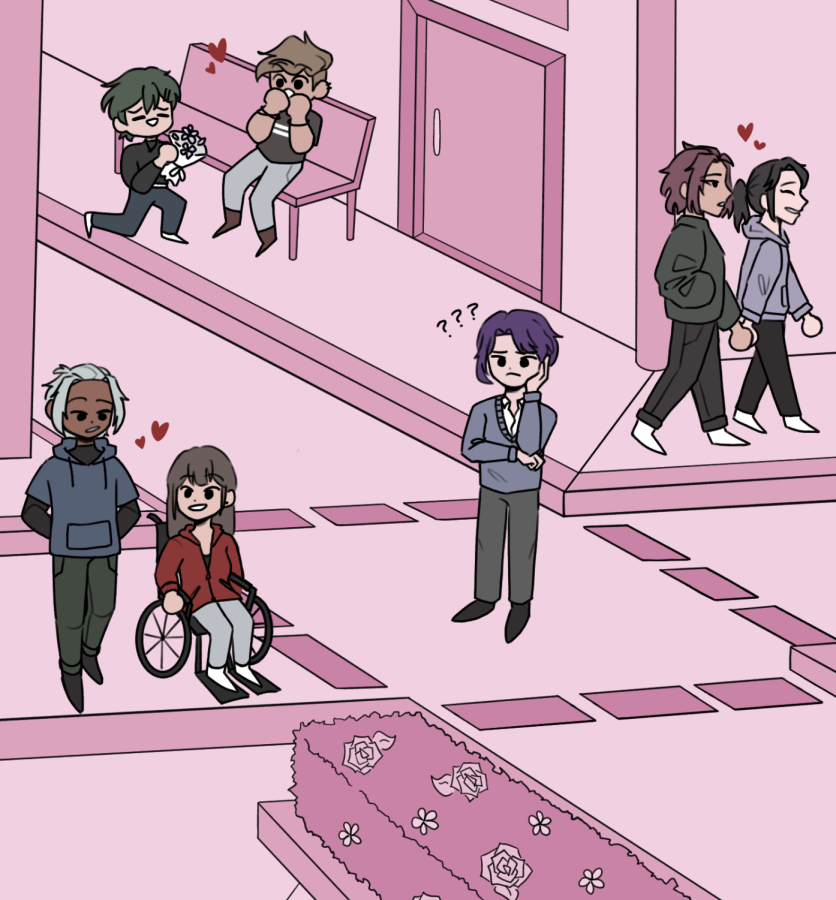Finding balance within romantic relationships
NO LOVER, NO PROBLEM: Don’t be distressed about not being in a romantic relationship this Valentine’s Day.
February 10, 2022
Seeing a couple’s hands clasped together, your palms feel suddenly empty. Your heart rushes with yearning, feeling suddenly stuck amid loneliness. Lying in bed and staring up at the ceiling, you are enamored: not by love itself, but with the idea of having it.
Romance is blossoming across campus like sweet roses, the aroma of love floating in the air as Valentine’s Day approaches. But this scent can leave teenagers in a daze, scrambling to rush into relationships solely to obtain the idealized image of love often flaunted by campus couples or depicted in coming-of-age films. It is worth noting, however, that a relationship built upon the unsturdy foundation of desperation may have devastating effects on an individual’s mental health and sense of identity. Therefore, high school students should understand that a romantic relationship is not necessary in order to find happiness.
The problem is this: Most people are not looking for a relationship, but rather a sense of belonging, acceptance and an escape from loneliness. But many go about this wrong. They see their peers become vivaciously joyful with their new significant other or watch as a movie protagonist gets their happily-ever-after once they’ve obtained the person of their dreams. They observe these cheerful relationships and mistakenly begin to equate romance with happiness and come to believe that love is the ultimate solution to their feelings of isolation.
Relying solely on a romantic partner to bring happiness can lead to toxic dependency, where individuals constantly require validation and attention from their significant other in order to feel comfortable with themselves.
“In romantic relationships, it is very common for teenagers to start prioritizing a person over other important things in their lives,” Northwood psychologist Jamie Carey said. “They might have trouble focusing on what they value or what they are working towards because they are intensely focused on how the person makes them feel. If we start to view another person as our only connection or most important connection, then we start to lose parts of ourselves that connect us to the rest of the world.”
Dependency isolates an individual from their surroundings, and so when conflicts arise with the person they heavily rely on, it can severely affect their mental health. Studies in Ireland and the United States found that negative interactions with romantic partners increase the risk of depression, anxiety and suicidal ideation. In high school, this stress can decline a student’s performance in schoolwork, extracurriculars and involvement in friendships.
“A bad relationship can lead to greater insight down the line, but being stuck in one can be draining on your energy and self-esteem,” psychology student senior Chloe Han said. “Breaking that cycle and building your self-esteem back up probably has the worst effect on your mental health.”
As much as relationships can help create a sense of community or belonging, it should not become the pinnacle of the “high school experience,” or a prerequisite to finding your happily-ever-after. Romance is not the gleaming treasure on a pedestal that will answer all your problems. When relationships are rushed for the sake of escaping a state of loneliness or obtaining “love,” it does not have a stable foundation to blossom into a legitimate companionship that will bring the comfort and love desired in the first place.
The relationships you focus on this Valentine’s Day don’t need to be romantic. Instead of scrambling to find a significant other, consider setting up platonic dates—with friends and family—to foster a different kind of supportive community. Watching a movie with friends and eating out with family can spark the same feelings of belonging and connection that a romantic relationship can. In fact, the importance of platonic and familial love is solidified in a clinical review with over 300,000 participants, which found that stronger social relationships with friends and family increased the likelihood of longevity.
While Valentine’s Day only focuses on one of the many important relationships in our lives, the sweetest love story of all may come from the often-forgotten love you must develop for yourself. There’s something romantic about simply spending time alone, going on a walk or bringing yourself out to a coffee date.
So, you may see romance blossoming across campus and desire that beautiful rose. But know that happiness doesn’t blossom from romance. No, for romance to blossom, you need to find happiness in yourself first.


























































